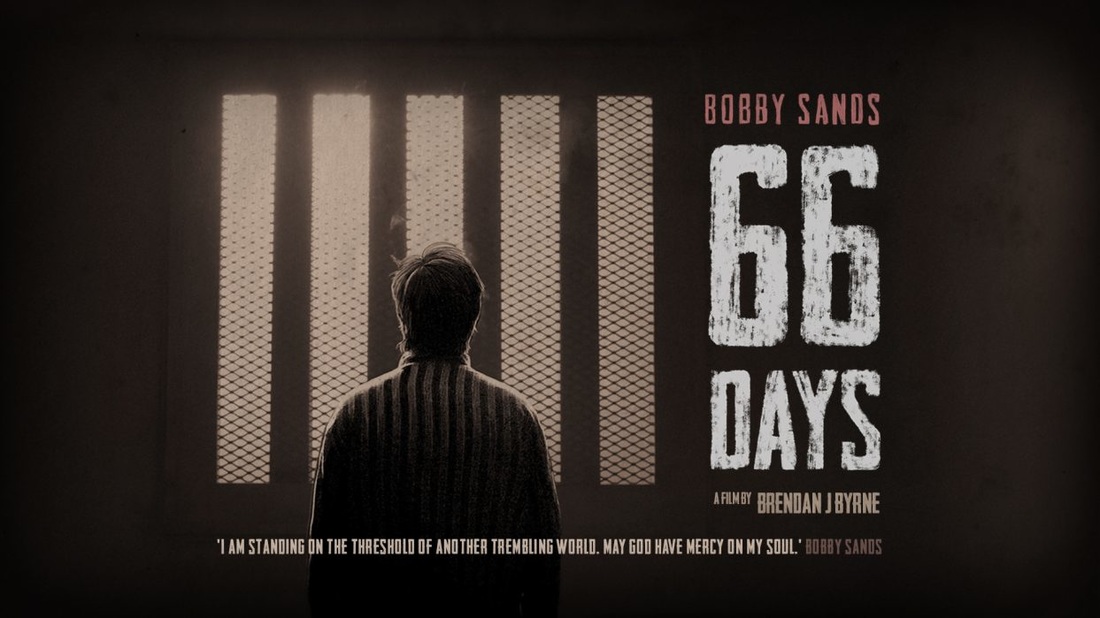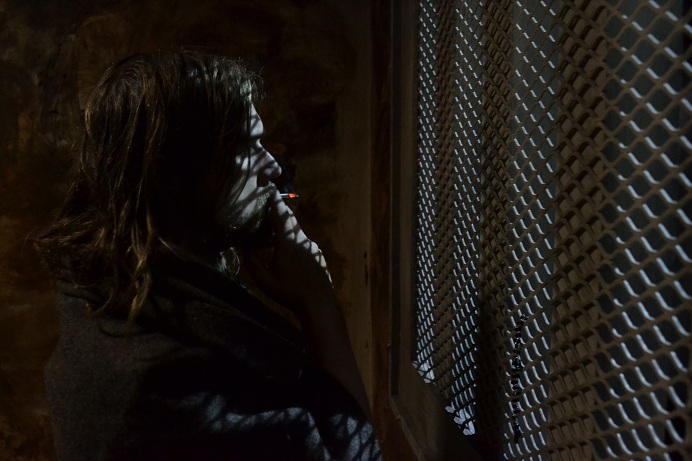The film has been championed in the media for having a balanced view on the Hunger Strikes, how they occurred, as well as the political stumbling blocks which prevented compromise. But to be honest as I queued behind a group of young pro-ana enthusiasts, three unmasked Sinn Fein members, and a bushy bearded man from Manchester I wasn’t sure what to expect.
As there is very little footage of Bobby Sands’ childhood the film opens with an animated depiction of his family being driven out of their home as a result of sectarian violence. This troubled background drives a young Sands to join the IRA at the tender age of 18 and shortly afterwards he serves his first sentence for the possession of fire arms.
In fact Bobby Sands would spend most of his adult life in prison on gun charges which is why there is no video footage of him, very little photographic material and only some of his writings survive to tell us about his experiences.
Given this void the film makers create a very artistic portrayal of the last 66 days of Bobby Sands life, with dark animations capturing the depression of the prison cells, neatly woven with melodic readings from Bobby Sands’ prison diary.
His diary makes several references to brutality and beatings within the prison system which the film somewhat skirts but the inclusion of an interview with one of the prison guards really sets the tone of prison life, ‘Blanket Protests’ and slop out attacks which lead to the ‘Dirty Protest’. Thirty five years later this prison guard shows no remorse or sympathy for the political prisoners of the H-Blocks, for the lives lost, or for the orders he carried out while attending men seeking ‘Special Category Status’ (The Special Category Status essentially allowed the prisoners to have Prisoners Of War status as laid out in the Geneva Convention).
These popcorn munching moments show the intensity of life in Northern Ireland at the time, and the political pressure cooker which steamed in the background is highlighted by the iron will of Maggie Thatcher, who was willing to let a member of her parliament starve to death before answering to the demands of the IRA.
The presence of journalist Fintan O’Toole is also note worthy as he speaks out against the atrocities committed by the IRA and the danger of elevating the now iconic Bobby Sands to martyrdom status. A view which would classify Sands as a good hero if you’re interested in educating your children in ‘provo’ violence, the art of manipulating civil rights movements into terrorist organisations.
I was a bit disappointed that the film portrayed itself as being a Bobby Sands documentary without really diving into his life, his motivations, and his thoughts of future actions or even revolution. I was hoping for more accounts of his life from family, friends and perhaps comrades.
Aside from my personal expectations being let down the film has to be complimented for being rich in content as it carefully captures a very gruesome period in Irish and British history. Even without the political bombshell which smoldered in the background this film highlights the measures a person will take to fight the oppression of his people and the injustices served upon him. The documentary opens the door for people unfamiliar with the troubles to explore more about the conflict and perhaps the more aware we are of past mistakes the better prepared we are for a brighter future.
I am a political prisoner. I am a political prisoner because I am a casualty of a perennial war that is being fought between the oppressed Irish people and an alien, oppressive, unwanted regime that refuses to withdraw from our land.
I believe and stand by the God-given right of the Irish nation to sovereign independence, and the right of any Irishman or woman to assert this right in armed revolution. That is why I am incarcerated, naked and tortured.
Foremost in my tortured mind is the thought that there can never be peace in Ireland until the foreign, oppressive British presence is removed, leaving all the Irish people as a unit to control their own affairs and determine their own destinies as a sovereign people, free in mind and body, separate and distinct physically, culturally and economically.
Even should there not be 100,000 unemployed in the North, their pittance of a wage would look shame in the company of those whose wage and profit is enormous, the privileged and capitalist class who sleep upon the people’s wounds, and sweat, and toils.
Total equality and fraternity cannot and never will be gained whilst these parasites dominate and rule the lives of a nation. There is no equality in a society that stands upon the economic and political bog if only the strongest make it good or survive. Compare the lives, comforts, habits, wealth of all those political conmen (who allegedly are concerned for us, the people) with that of the wretchedly deprived and oppressed.
Compare it in any decade in history, compare it tomorrow, in the future, and it will mock you. Yet our perennial blindness continues. There are no luxuries in the H-Blocks. But there is true concern for the Irish people.
I am making my last response to the whole vicious inhuman atrocity they call H-Block. But, unlike their laughs and jibes, our laughter will be the joy of victory and the joy of the people, our revenge will be the liberation of all and the final defeat of the oppressors of our aged nation.
They will not criminalise us, rob us of our true identity, steal our individualism, depoliticise us, churn us out as systemised, institutionalised, decent law-abiding robots. Never will they label our liberation struggle as criminal.
We wish to be treated ‘not as ordinary prisoners’ for we are not criminals. We admit no crime unless, that is, the love of one’s people and country is a crime.
There is that much to be done that no select or small portion of people can do, only the greater mass of the Irish nation will ensure the achievement of the Socialist Republic, and that can only be done by hard work and sacrifice.


 RSS Feed
RSS Feed
